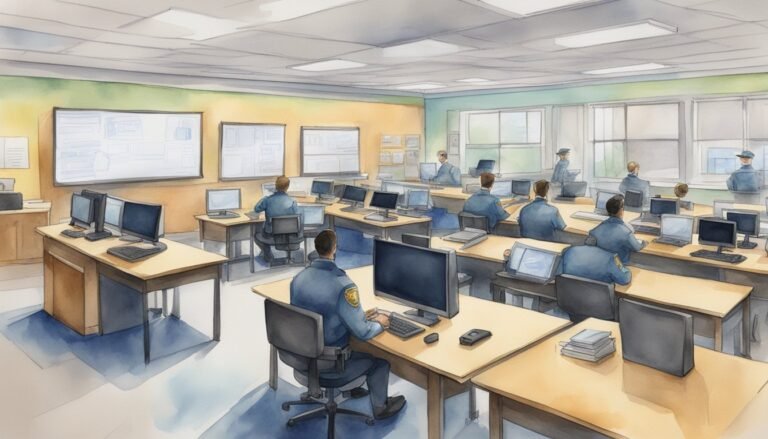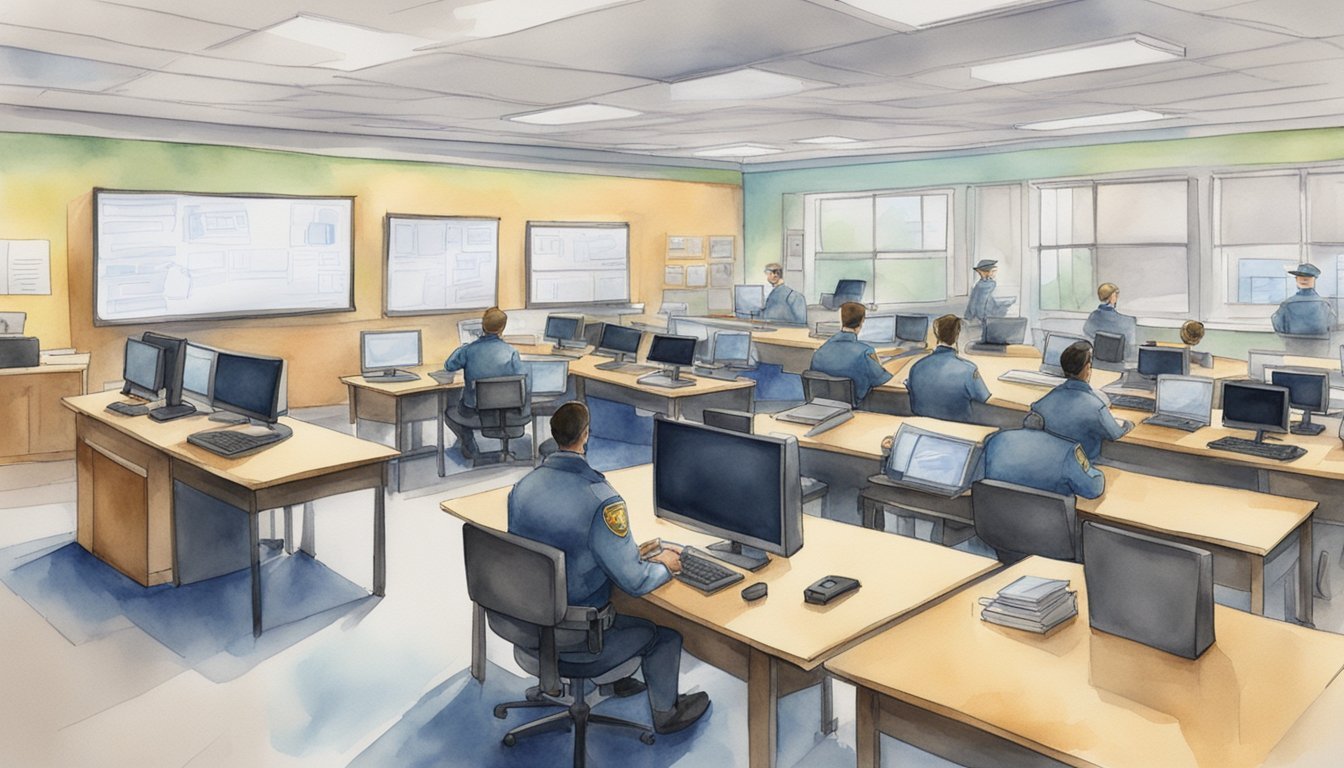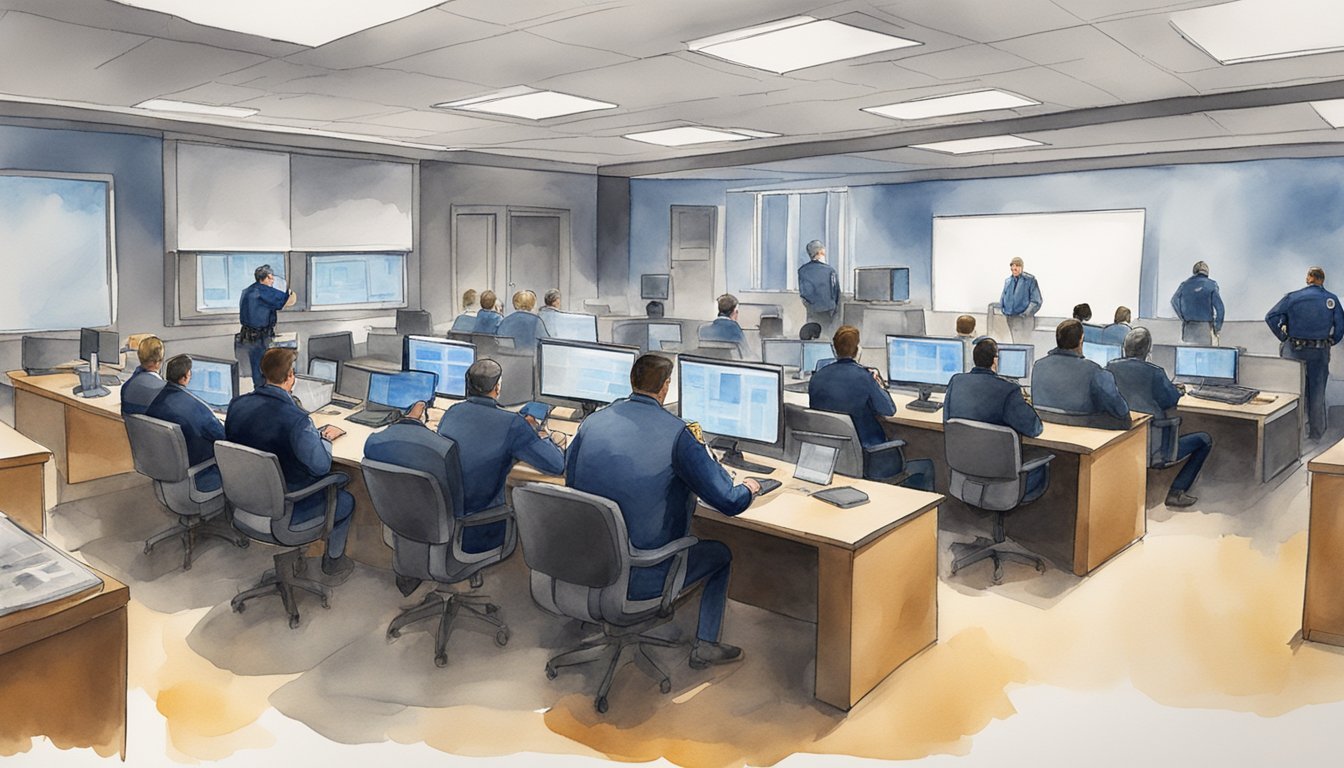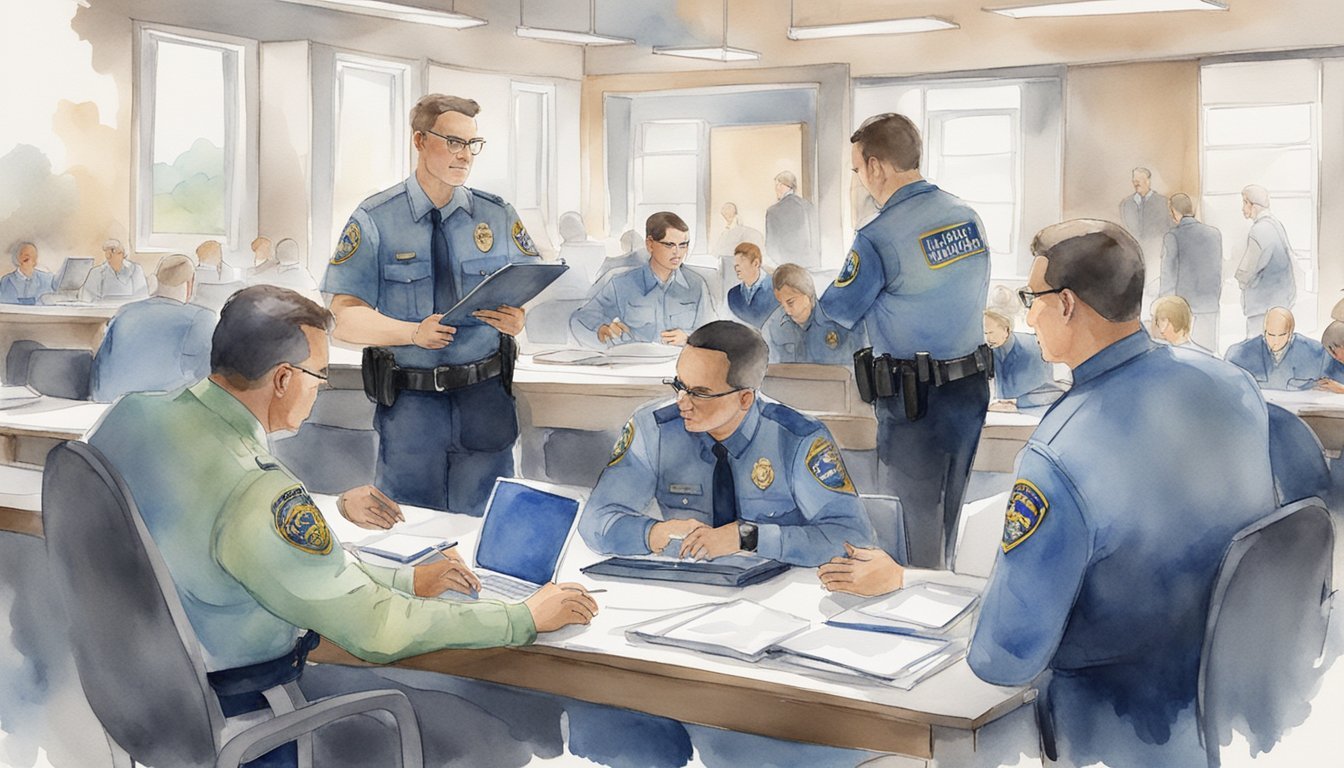6 Digital Forensics Training Programs for Law Enforcement: Enhancing Cybercrime Investigation Skills

Digital forensics is a key skill for law enforcement in today’s tech-driven world.
As criminals use more advanced digital tools, police need to keep up.
Training in digital forensics helps officers solve crimes and gather evidence.

You can find many programs to learn digital forensics skills. These courses teach how to examine computers, phones, and other devices for clues.
They also cover how to present digital evidence in court.
This article will look at six top training options for law enforcement.
1) National Computer Forensics Institute
The National Computer Forensics Institute (NCFI) is a top-notch training center for law enforcement.
It’s located in Hoover, Alabama and offers state-of-the-art facilities for learning about cyber and electronic crime forensics.
At NCFI, you’ll find courses tailored for different roles in the justice system.
These include programs for police officers, prosecutors, and judges.
The goal is to help you handle cases involving digital evidence more effectively.
The institute opened its doors in 2008.
Since then, it has been training and equipping state, local, tribal, and territorial law enforcement professionals.
It’s funded by the federal government, making it a key resource for agencies across the country.
When you attend NCFI, you’ll learn from experts in the field.
The training covers a wide range of topics related to cyber threats and electronic crimes.
This knowledge is crucial in today’s digital age where many crimes involve computers or electronic devices.
NCFI’s mission goes beyond just teaching.
They also provide you with the tools you need to apply your new skills back at your job.
This practical approach helps ensure you can put your training to use right away in real-world cases.
2) FBI Cyber Investigator Certification

The FBI offers a valuable Cyber Investigator Certificate Program (CICP) for law enforcement professionals.
This program aims to enhance your skills in handling digital evidence at crime scenes.
As a law enforcement officer, you can access this training for free.
The CICP is designed to improve your ability to survey and secure crime scenes with digital artifacts.
The program consists of self-guided, online courses that you can complete at your own pace.
It’s open to local, state, tribal, territorial, and federal law enforcement personnel.
By participating in the CICP, you’ll learn essential techniques for preserving digital evidence.
This knowledge is crucial in today’s tech-driven world, where digital clues are often key to solving cases.
The training covers various aspects of cyber investigation.
You’ll gain skills in handling different types of digital devices and understanding how to extract valuable information from them.
Upon completion, you’ll receive a certificate that recognizes your specialized skills in cyber investigation.
This certification can be a valuable addition to your professional credentials.
3) Certified Cyber Crime Investigator (CCCI)
The Certified Cyber Crime Investigator (CCCI) program is a valuable certification for law enforcement professionals.
It focuses on enhancing your skills in investigating digital crimes.
You can earn this certification through the IAFCI (International Association of Financial Crimes Investigators).
The CCCI program covers a wide range of topics related to cyber crime investigation.
By obtaining this certification, you demonstrate your advanced knowledge and skills in the field.
It shows that you can be trusted to handle complex cyber crime cases effectively.
The CCCI program helps you stay up-to-date with the latest techniques and tools used in digital forensics.
You’ll learn how to collect, analyze, and present digital evidence in a legal setting.
This certification can boost your career prospects in law enforcement.
It sets you apart as a specialist in cyber crime investigation, which is increasingly important in today’s digital world.
To maintain your CCCI status, you’ll need to complete ongoing training and education.
This ensures that your skills remain current in the fast-changing field of cyber crime investigation.
4) National White Collar Crime Center Training

The National White Collar Crime Center (NW3C) offers free training to law enforcement in digital forensics and cybercrime investigation.
Their courses cover essential skills for modern policing.
NW3C’s computer crime section focuses on cyber investigation and forensics.
You’ll learn how to handle digital evidence properly and use forensic tools effectively.
One key course is the Basic Digital Forensic Examination.
It teaches you how to perform limited digital forensic exams and validate forensic tools.
You can also take classes on testifying as an expert witness in court.
These help you present digital evidence clearly and professionally during trials.
NW3C training is available to law enforcement, regulatory agencies, and prosecutors.
Their goal is to help you prevent, investigate, and prosecute economic and high-tech crimes.
The center has been training law enforcement since 1978.
They’ve built a strong reputation for high-quality, practical instruction.
You can access NW3C courses online or in-person.
This flexibility makes it easier to fit training into your busy schedule.
By taking NW3C courses, you’ll join a nationwide network of trained cybercrime investigators.
This can be valuable for sharing knowledge and resources.
5) High Technology Crime Investigation Association

The High Technology Crime Investigation Association (HTCIA) offers top-notch digital forensics training for law enforcement.
Founded in 1986, HTCIA is a well-respected organization in the field of high-tech crime investigations.
HTCIA provides various training opportunities to help you enhance your skills.
Their programs cover a wide range of topics related to digital forensics and cybercrime investigations.
One of their main events is the annual Global Training Event.
This conference brings together experts and professionals from around the world.
You can attend workshops, presentations, and networking sessions to stay up-to-date with the latest techniques and tools.
HTCIA also offers online training courses through their learning platform.
These courses allow you to learn at your own pace and fit training into your busy schedule.
By joining HTCIA, you gain access to a community of experienced professionals.
This network can be invaluable for sharing knowledge and getting advice on complex cases.
HTCIA’s training programs are designed to meet the evolving needs of law enforcement in the digital age.
You’ll learn practical skills that can be applied directly to your investigations.
Whether you’re new to digital forensics or an experienced investigator, HTCIA has training options to suit your needs.
Their programs can help you stay ahead in the rapidly changing field of high-tech crime investigations.
6) International Association of Computer Investigative Specialists

The International Association of Computer Investigative Specialists (IACIS) is a leading organization in digital forensics training.
They offer cutting-edge computer forensics training designed to prepare you for fieldwork and certification programs.
IACIS provides the Basic Computer Forensic Examiner (BCFE) training.
This program aims to teach you essential skills while ensuring no student falls behind.
The classes mix computer forensic theory with hands-on exercises.
One of the key features of IACIS training is the low student-to-trainer ratio.
With a 6/8:1 ratio, you’ll get plenty of individual attention and support during your learning journey.
After completing the training, you can pursue the Certified Forensic Computer Examiner (CFCE) certification.
This program is based on core competencies in digital forensics and consists of two phases: peer review and certification.
The CFCE certification is globally recognized and caters mainly to law enforcement and private sector professionals.
It’s an excellent way to validate your skills in digital investigations.
To become a member of IACIS and take the CFCE, you typically need to be a full-time member of a law enforcement agency, either sworn or unsworn.
This requirement ensures that the training reaches those actively working in the field.
IACIS also hosts an annual training event.
The next one is scheduled for April 28 – May 9, 2025, in Orlando.
These events provide great opportunities for learning and networking with other professionals in your field.
Overview of Digital Forensics Training

Digital forensics training equips law enforcement with crucial skills to investigate cyber crimes and gather digital evidence.
These programs cover essential techniques and tools for analyzing digital devices and data.
Importance for Law Enforcement
Digital forensics training is vital for modern law enforcement.
It helps you handle electronic evidence properly and legally.
With proper training, you can recover and analyze digital data from computers, phones, and other devices.
This knowledge is key for solving many types of crimes.
Cyber attacks, fraud, and even traditional crimes often leave digital traces.
By learning digital forensics, you can uncover these clues and build stronger cases.
Training also keeps you up-to-date with new technologies.
Criminals constantly find new ways to hide their tracks online. Ongoing education helps you stay one step ahead.
Key Skills and Competencies
Digital forensics training teaches you several important skills:
- Data acquisition: Learn to safely copy and preserve digital evidence.
- File system analysis: Understand how to examine different operating systems.
- Network forensics: Trace online activities and connections.
- Mobile device forensics: Extract data from smartphones and tablets.
You’ll also gain competency in using forensic software tools.
These help you recover deleted files, crack passwords, and analyze internet history.
Legal knowledge is another crucial part of training.
You’ll learn how to handle evidence so it’s admissible in court.
This includes maintaining chain of custody and writing detailed reports.
Curriculum Components

Digital forensics training programs for law enforcement cover essential skills and knowledge areas.
They blend theoretical concepts with hands-on practice to prepare officers for real-world investigations.
Core Modules
The core modules focus on fundamental digital forensics concepts and techniques.
You’ll learn about different types of digital evidence and how to handle them properly.
Key topics include:
- File system analysis
- Network forensics
- Mobile device forensics
- Cloud forensics
- Legal and ethical considerations
These modules provide a strong foundation in digital evidence acquisition and analysis.
You’ll study various operating systems, including Windows, iOS, and Android.
The curriculum also covers RAM capture analysis and social media artifact evaluation.
Practical Exercises
Hands-on experience is crucial in digital forensics training.
You’ll engage in realistic scenarios to apply your knowledge.
Practical exercises may include:
- Simulated crime scene investigations
- Data recovery from damaged devices
- Malware analysis and containment
- Digital evidence preservation techniques
These exercises help you develop critical skills for forensic analysis.
You’ll learn to conduct forensically sound acquisitions of digital evidence from mobile devices and external media.
The training also covers cell technologies and framing investigative questions.
Assessment Methods
Your progress and competency are evaluated through various assessment methods.
These ensure you’ve mastered the necessary skills.
Common assessment techniques include:
- Written exams testing theoretical knowledge
- Practical exams evaluating hands-on skills
- Case study analyses
- Group projects simulating real investigations
Assessments often mirror real-world scenarios you’ll face in the field.
They test your ability to apply advanced investigation techniques and follow proper procedures.
Successful completion of these assessments demonstrates your readiness to handle digital forensics tasks in law enforcement roles.
Benefits of Specialized Training
Specialized digital forensics training equips law enforcement with crucial skills for modern investigations.
It enhances evidence handling and boosts career prospects in this growing field.
Case Studies
Digital forensics training programs have proven valuable in real-world cases.
You’ll learn techniques for analyzing various operating systems, including Windows, iOS, and Android.
These skills help you recover critical evidence from digital devices.
For example, you might extract deleted messages or locate hidden files that crack a case wide open.
Training also covers emerging areas like social media forensics.
You’ll gain the ability to document and analyze social media artifacts, which can provide key leads in investigations.
Career Advancement
Specialized training can significantly boost your law enforcement career.
As technology evolves, agencies increasingly need officers with digital forensics expertise.
By completing programs like the Digital Forensics Investigator courses, you position yourself for advancement.
You’ll gain skills in forensically sound evidence acquisition and processing.
These abilities make you a valuable asset to your department.
You might become the go-to expert for digital evidence, leading to new responsibilities and leadership roles.
Additionally, your expertise can open doors to specialized units or task forces focused on cybercrime and digital investigations.
Frequently Asked Questions

Digital forensics training programs offer various options for law enforcement professionals.
These programs range from accredited courses to specialized certifications and free resources.
What are some accredited digital forensics training programs available for law enforcement officers?
The National Computer Forensics Institute offers accredited programs for law enforcement.
They provide hands-on training in digital evidence recovery and analysis.
The Digital Forensics Examiner Program teaches fundamental forensic analysis techniques for Windows, iOS, and Android systems.
How can law enforcement personnel enroll in cybercrime training courses?
You can enroll in cybercrime training courses through your agency’s training department.
Many programs are offered at no cost to qualified law enforcement personnel.
Check with organizations like the High Technology Crime Investigation Association for course listings and enrollment details.
What certifications are available for a certified digital forensics examiner?
The FBI Cyber Investigator Certification is a respected credential in the field.
It covers advanced topics in digital forensics and cybercrime investigation.
Another option is the Certified Cyber Crime Investigator (CCCI) certification.
This program focuses on practical skills for investigating cyber-related crimes.
Are there specialized training courses for digital forensics within the FBI available to local law enforcement?
The FBI offers some specialized digital forensics courses to local law enforcement.
These programs are typically coordinated through your state’s FBI field office.
Contact your local FBI liaison for information on available training opportunities and eligibility requirements.
What free resources exist for law enforcement to learn about cyber crime investigation?
The National White Collar Crime Center offers free online training modules on cybercrime investigation topics.
You can also find webinars and virtual workshops hosted by various law enforcement organizations throughout the year.
What are the career prospects and potential salary for a Certified Digital Forensics Examiner?
Certified Digital Forensics Examiners are in high demand in both public and private sectors.
Salaries vary based on experience and location.
In law enforcement, you may advance to specialized cybercrime units or task forces.
Private sector roles often offer higher salaries but may require relocation.






